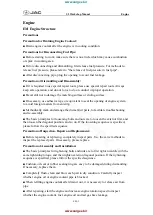
Temperature
The temperature grades are A, the highest, B,
and C, representing the tire's resistance to the
generation of heat and its ability to dissipate
heat when tested under controlled conditions
on a specified indoor laboratory test wheel.
Sustained high temperature can cause the ma‐
terial of the tire to degenerate and reduce tire
life, and excessive temperature can lead to
sudden tire failure. The grade C corresponds
to a level of performance which all passenger
vehicle tires must meet under the Federal Mo‐
tor Vehicle Safety Standard No. 109. Grades
Band A represent higher levels of performance
on the laboratory test wheel than the minimum
required by law.
WARNING
The temperature grade for this tire is es‐
tablished for a tire that is properly inflated and
not overloaded. Excessive speed, underinfla‐
tion, or excessive loading, either separately or
in combination, can cause heat buildup and
possible tire failure.◀
M+S
Winter and all-season tires with better cold
weather performance than summer tires.
Tire tread
Summer tires
Do not drive with a tire tread of less than
0.12 in/3 mm, otherwise there is an increased
risk of hydroplaning.
Winter tires
Do not drive with a tire tread of less than
0.16 in/4 mm, as such tires are less suitable for
winter operation.
Minimum tread depth
Wear indicators are distributed around the
tire's circumference and have the legally re‐
quired minimum height of 0.063 in‐
ches/1.6 mm.
The positions of the wear indicators are
marked on the tire sidewall with TWI, Tread
Wear Indicator.
Tire damage
General information
Inspect your tires regularly for damage, foreign
objects lodged in the tread, and tread wear.
Driving over rough or damaged road surfaces,
as well as debris, curbs and other obstacles
can cause serious damage to wheels, tires and
suspension parts. This is more likely to occur
with low-profile tires, which provide less cush‐
ioning between the wheel and the road. Be
careful to avoid road hazards and reduce your
speed, especially if your vehicle is equipped
with low-profile tires.
Indications of tire damage or other vehicle mal‐
functions:
▷
Unusual vibrations.
▷
Unusual tire or running noises.
▷
Unusual handling such as a strong ten‐
dency to pull to the left or right.
Damage can be caused by the following situa‐
tions, for instance:
▷
Driving over curbs.
Seite 191
Wheels and tires
Mobility
191
Online Edition for Part no. 01402981836 - VI/17
Summary of Contents for M2 COUPE
Page 2: ......
Page 13: ...Information 13 Online Edition for Part no 01402981836 VI 17...
Page 14: ...Online Edition for Part no 01402981836 VI 17...
Page 48: ...Online Edition for Part no 01402981836 VI 17...
Page 169: ...Storage compartments Controls 169 Online Edition for Part no 01402981836 VI 17...
Page 170: ...Online Edition for Part no 01402981836 VI 17...
Page 182: ...Online Edition for Part no 01402981836 VI 17...
Page 207: ...Engine oil Mobility 207 Online Edition for Part no 01402981836 VI 17...
Page 229: ...Care Mobility 229 Online Edition for Part no 01402981836 VI 17...
Page 230: ...Online Edition for Part no 01402981836 VI 17...
Page 235: ...Appendix Reference 235 Online Edition for Part no 01402981836 VI 17...
Page 246: ......
















































